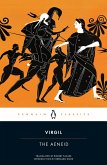Ten years ago, at the age of 82, David Ferry (b. 1924) began translating Virgil's epic, in between working on his other poems and translations. This new rendering, which is likely to supplant the current standard editions of the poem, recreates in immediate, forward moving, and rhythmic contemporary American English that "sound-and-sense witchery, at once stately and debauched, of Virgil's Latin" (as noted by one of the Press's readers). It offers a new way into this timeless work for poetry lovers of all levels of knowledge and experience, and will be, without a doubt, the crowning achievement for the National Book Award-winning Ferry. The publication of a new Virgil for a new generation of readers will be an extraordinary event for American letters.
Hinweis: Dieser Artikel kann nur an eine deutsche Lieferadresse ausgeliefert werden.
Hinweis: Dieser Artikel kann nur an eine deutsche Lieferadresse ausgeliefert werden.








